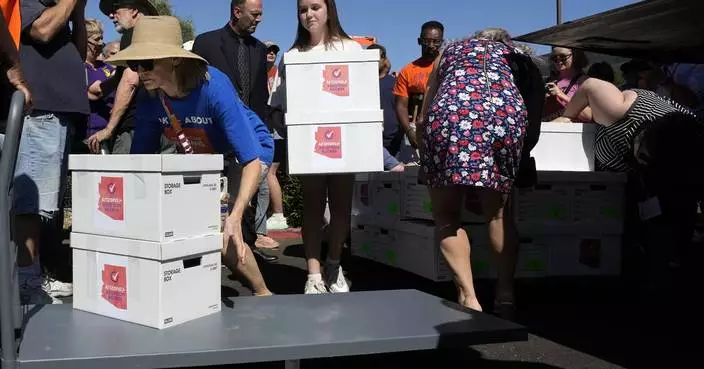The House has approved legislation that would ban TikTok if its Beijing-based parent company doesn’t divest from the popular social media platform, escalating the fight over the hot-button issue.
The TikTok legislation, which was included in a package of bills that would send aid to Ukraine and Israel, could become law as soon as next week if the Senate moves quickly.
Here’s what you need to know:
In March, the House passed legislation that would require ByteDance, TikTok’s parent, to sell the platform within six months, or face a ban in the United States.
But some senators, including the Democratic Senate Commerce Committee Chairwoman Maria Cantwell, had expressed concerns that the six-month deadline would be too short to carry out a complex deal that could be worth tens of billions of dollars. Following negotiations with the Senate on the issue, the House included a modified version of the legislation in the foreign aid package.
The revised legislation would give ByteDance nine months to sell TikTok, and a possible three-month extension if a sale was in progress. The bill would also bar the company from controlling TikTok’s secret sauce: the algorithm that feeds users videos based off their interests.
Cantwell, who has powers over the TikTok bill in the Senate, had previously expressed concerns that it could stand to legal scrutiny. However, she said in a statement Wednesday evening that she supports the updated legislation.
Lawmakers from both parties — as well as law enforcement and intelligence officials — have long expressed concerns that Chinese authorities could force ByteDance to hand over data on the 170 million Americans who use TikTok. The worry stems from a set of Chinese national security laws that compel organizations to assist with intelligence gathering - which ByteDance would likely be subject to – and other far-reaching ways the country’s authoritarian government exercises control.
Opponents of the bill, though, counter that the Chinese government could easily get information on Americans in other ways, including through commercial data brokers that sell or rent personal information.
Lawmakers and some administration officials have also expressed concerns that China could - potentially – direct or influence ByteDance to suppress or boost TikTok content that are favorable to its interests. TikTok, for its part, has denied assertions that it could be used as a tool of the Chinese government. The company has also said it has never shared U.S. user data with Chinese authorities and won’t do so if it’s asked.
In early March, Rep. Mike Gallagher, the Republican chair of the House Select Committee on the Chinese Communist Party who’s behind the TikTok bill, introduced a House resolution that lists concerns many lawmakers have expressed about the platform. But to date, the U.S. government has not provided public evidence that shows TikTok sharing U.S. user information with Chinese authorities, or Chinese officials tinkering with the company’s algorithm.
The package that included the updated TikTok measure has bipartisan momentum, but it’s also facing pushback from hard-right conservatives who are opposed to providing assistance to Ukraine in its war with Russia.
Attaching the TikTok bill to the aid package is expected to expedite efforts to pass the regulatory measure, which has broad bipartisan support in the Senate.
However, it has encountered opposition in that chamber from some lawmakers who say it sets a dangerous precedent. In an X post last month, Republican Sen. Rand Paul of Kentucky called the House bill “a misguided overreach” and “a draconian measure that stifles free expression, tramples constitutional rights, and disrupts the economic pursuits of millions of Americans.”
President Joe Biden has said he will sign the TikTok legislation if it gets to his desk. If that does happen, it’s expected to be challenged by TikTok, which has sued to counter previous attempts to ban the platform both nationally and at the state level.
Since mid-March, TikTok has spent more than $5 million on TV ads opposing the legislation, including in battleground states like Pennsylvania, Nevada and Ohio, according to AdImpact, an advertising tracking firm.
The company is also attempting to counter the bill by emphasizing its investments in data safety, and the positive impacts it has on the lives of content creators and small businesses who rely on it for income and have fostered a community on its platform.
When asked for comment on Thursday, TikTok spokesperson Alex Haurek said: “It is unfortunate that the House of Representatives is using the cover of important foreign and humanitarian assistance to once again jam through a ban bill that would trample the free speech rights of 170 million Americans, devastate 7 million businesses, and shutter a platform that contributes $24 billion to the U.S. economy, annually.”
Some digital rights and free speech groups have backed TikTok. The American Civil Liberties Union reiterated its opposition to the House bill on Thursday, arguing the extension given to ByteDance under the new bill wasn’t “meaningfully different from the last one” and that the end result of the bill would be a TikTok ban.
While some people have voiced an interest in buying TikTok’s U.S. business — among them “Shark Tank” star Kevin O’Leary and former Treasury secretary Steven Mnuchin — there are several challenges to getting it done.
“Somebody would have to actually be ready to shell out the large amount of money that this product and system is worth,” said Stanford University researcher Graham Webster, who studies Chinese technology policy and U.S.-China relations.
“But even if somebody has deep enough pockets and is ready to go into negotiating to purchase, this sort of matchmaking on acquisitions is not quick.”
Big tech companies could afford it but would likely face intense scrutiny from antitrust regulators in both the U.S. and China. Some are also still bruised after the then-Trump administration’s 2020 attempt to force a sale brought several bids that never panned out.
Then again, if the revised legislation becomes law and survives potential court challenges, it could make TikTok cheaper to buy.
China, which has been clamping down on exports of recommendation algorithms by Chinese tech companies, is also likely to oppose a sale of TikTok’s algorithm that has made the platform successful. That means a potential buyer would essentially have to rebuild important components of the short-form video app.
AP journalist Mary Clare Jalonick and Matt O'Brien contributed to this report from Washington.
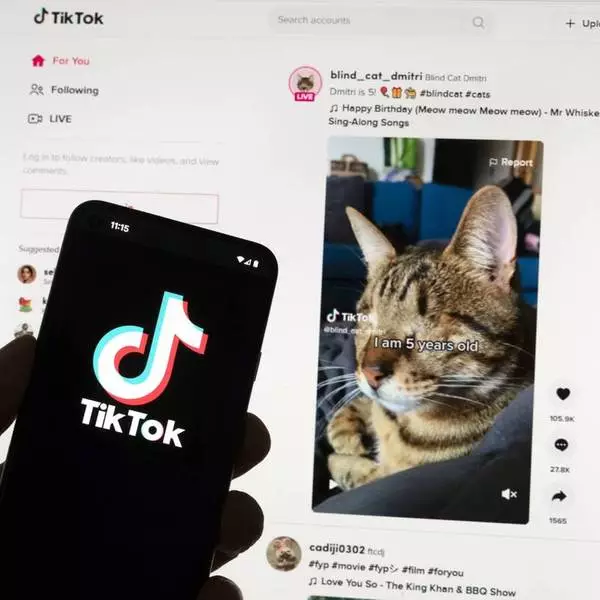
Bill that could ban TikTok has been attached to the House foreign aid package. What next?
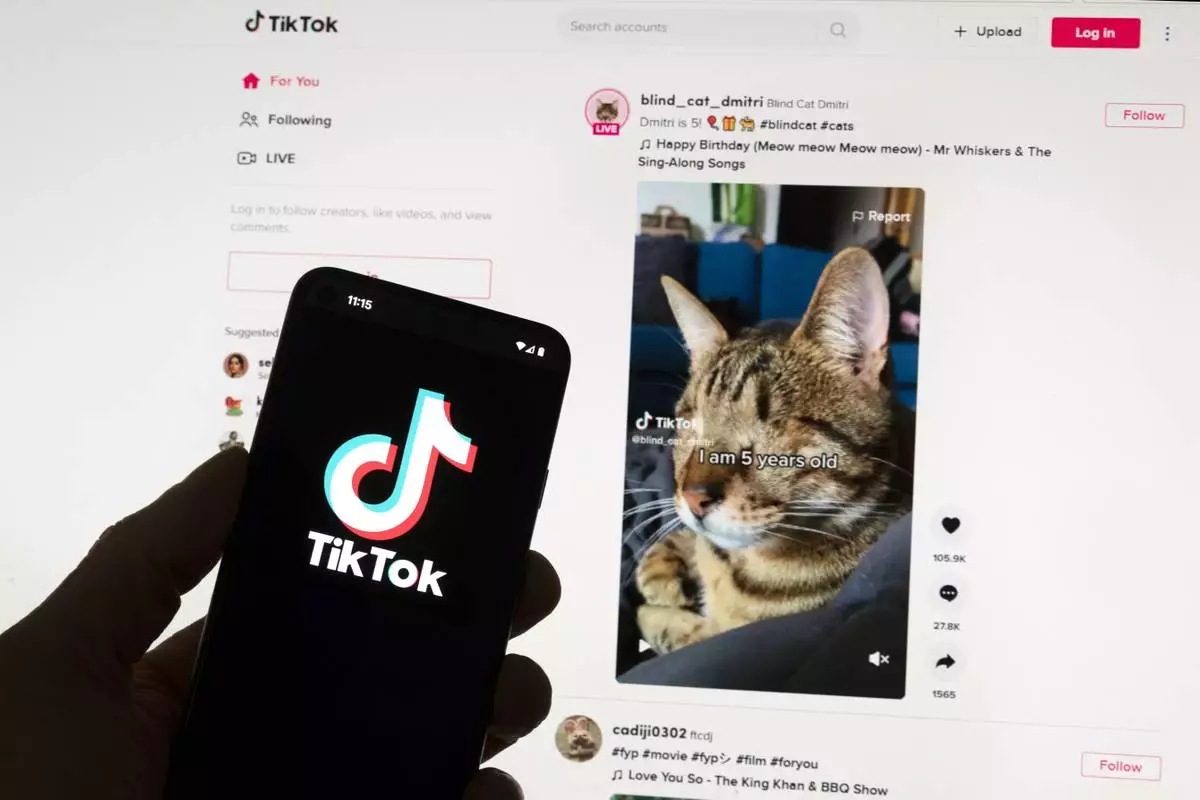
FILE - The TikTok logo is seen on a mobile phone in front of a computer screen which displays the TikTok home screen, Saturday, March 18, 2023, in Boston. European Union regulators said Wednesday, April 17, 2024, they're seeking details from TikTok on a new app from the video sharing platform that pays users to watch videos. (AP Photo/Michael Dwyer, File)
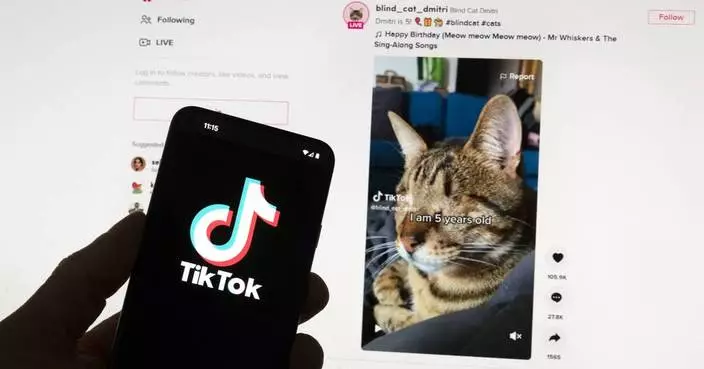
Bill that could ban TikTok has been attached to the House foreign aid package. What next?
WEST PALM BEACH, Fla. (AP) — Israeli Prime Minister Benjamin Netanyahu worked to mend ties with Republican presidential candidate Donald Trump on Friday and offered measured optimism about progress toward a cease-fire deal for Gaza as he neared the end of a contentious U.S. visit that put on display the growing American divisions over support for the Israeli-Hamas war.
At Trump's Florida Mar-a-Lago estate, where the two men met face-to-face for the first time in nearly four years, Netanyahu told journalists he wanted to see U.S.-mediated talks succeed for a cease-fire and release of hostages.
“I hope so,” Netanyahu said, when reporters asked if his U.S. trip had made progress. While Netanyahu at home is increasingly accused of resisting a deal to end the 9-month-old war to stave off the potential collapse of his far-right government when it ends, he said Friday he was "certainly eager to have one. And we’re working on it.”
As president, Trump went well beyond his predecessors in fulfilling Netanyahu’s top wishes from the United States. Yet relations soured after Netanyahu became one of the first world leaders to congratulate Joe Biden for his 2020 presidential victory, which Trump continues to deny.
The two men now have a strong interest in restoring their relationship, both for the political support their alliance brings and for the luster it gives each with their conservative supporters.
A beaming Trump was waiting for Netanyahu on the stone steps outside his private club and residence in Palm Beach, Florida. He warmly clasped the hands of the Israeli leader.
“We’ve always had a great relationship,” Trump insisted before journalists. Asked as the two sat down in a muraled room for talks if Netanyahu’s trip to Mar-a-Lago was repairing their bond, Trump responded, “It was never bad.”
For both men, Friday’s meeting was aimed at highlighting for their home audiences their depiction of themselves as strong leaders who have gotten big things done on the world stage, and can again.
Netanyahu’s Florida trip followed a fiery address to a joint meeting of Congress on Wednesday that defended his government’s conduct of the war and condemned American protesters galvanized by the killing of more than 39,000 Palestinians in the conflict.
On Thursday, Netanyahu had met in Washington with Biden and Vice President Kamala Harris, who appears on track to becoming the new Democratic presidential nominee after Biden decided to step out of the race. Both pressed the Israeli leader to work quickly to wrap up a deal to bring a cease-fire and release hostages held by Hamas.
Trump’s campaign said he pledged in Friday's meeting to “make every effort to bring peace to the Middle East” and combat antisemitism on college campuses if American voters elect him to the presidency in November.
Netanyahu handed Trump a framed photo that the Israeli leader said showed a child who has been held hostage by Hamas-led militants since the first hours of the war. “We’ll get it taken care of,” Trump assured him.
In a speech later Friday before a group of young Christian conservatives, Trump said he also asked Netanyahu during their meeting how “a Jewish person, or a person that loves Israel” can vote for Democrats.
He also laced into Harris for missing Netanyahu's speech and claimed she “doesn’t like Jewish people” and “doesn’t like Israel." Harris has been married to a Jewish man for a decade.
For Trump, the meeting was a chance to be cast as an ally and statesman, as well as to sharpen efforts by Republicans to portray themselves as the party most loyal to Israel.
Divisions among Americans over U.S. support for Israel’s war against Hamas in Gaza have opened cracks in years of strong bipartisan backing for Israel, the biggest recipient of U.S. aid.
For Netanyahu, repairing relations with Trump is imperative given the prospect that Trump may once again become president of the United States, which is Israel’s vital arms supplier and protector.
One gamble for Netanyahu is whether he could get more of the terms he wants in any deal on a Gaza cease-fire and hostage release, and in his much hoped-for closing of a normalization deal with Saudi Arabia, if he waits out the Biden administration in hopes that Trump wins.
“Benjamin Netanyahu has spent much of his career in the last two decades in tethering himself to the Republican Party,” said Aaron David Miller, a former U.S. diplomat for Arab-Israeli negotiations, now a senior fellow at the Carnegie Endowment for International Peace.
For the next six months, that means “mending ties with an irascible, angry president," Miller said, meaning Trump.
Netanyahu and Trump last met at a September 2020 White House signing ceremony for the signature diplomatic achievement of both men’s political careers. It was an accord brokered by the Trump administration in which the United Arab Emirates and Bahrain agreed to establish normal diplomatic relations with Israel.
For Israel, it amounted to the two countries formally recognizing it for the first time. It was a major step in what Israel hoped would be an easing of tensions and a broadening of economic ties with its Arab neighbors.
In public postings and statements after his break with Netanyahu, Trump portrayed himself as having stuck his neck out for Israel as president, and Netanyahu paying him back with disloyalty.
He also has criticized Netanyahu on other points, faulting him as “not prepared” for the Oct. 7 Hamas attacks that started the war in Gaza, for example.
In his high-profile speech to Congress on Wednesday and again Friday at Mar-a-Lago, Netanyahu poured praise on Trump, calling the regional accords Trump helped broker historic and thanking him “for all the things he did for Israel.”
Netanyahu listed actions by the Trump administration long-sought by Israeli governments — the U.S. officially saying Israel had sovereignty over the Golan Heights, captured from Syria during a 1967 war; a tougher U.S. policy toward Iran; and Trump declaring Jerusalem the capital of Israel, breaking with longstanding U.S. policy that Jerusalem's status should be decided in Israeli-Palestinian negotiations.
“I appreciated that,” Trump told “Fox & Friends” on Thursday, referring to Netanyahu's praise.
Trump has repeatedly urged that Israel with U.S. support “finish the job” in Gaza and destroy Hamas, but he hasn’t elaborated on how.
Natalie Melzer in Tel Aviv, Israel, Adriana Gomez Licon in West Palm Beach, Florida, and Jill Colvin in New York contributed. Knickmeyer reported from Washington. Price reported from New York.
Follow the AP's coverage of the 2024 election at https://apnews.com/hub/election-2024.
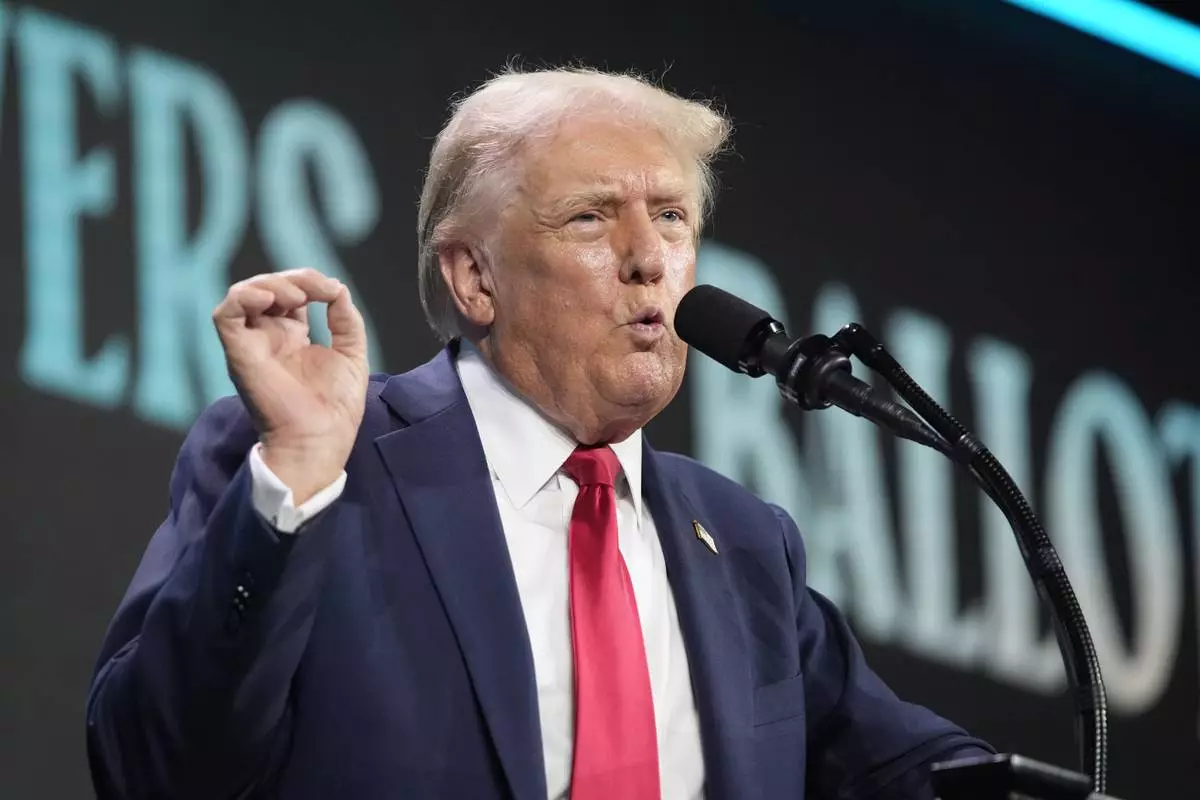
Republican presidential candidate former President Donald Trump speaks at the Turning Point Believers' Summit, Friday, July 26, 2024, in West Palm Beach, Fla. (AP Photo/Alex Brandon)

Republican presidential candidate former President Donald Trump listens as he meets with Israeli Prime Minister Benjamin Netanyahu at his Mar-a-Lago estate, Friday, July 26, 2024, in Palm Beach, Fla. (AP Photo/Alex Brandon)
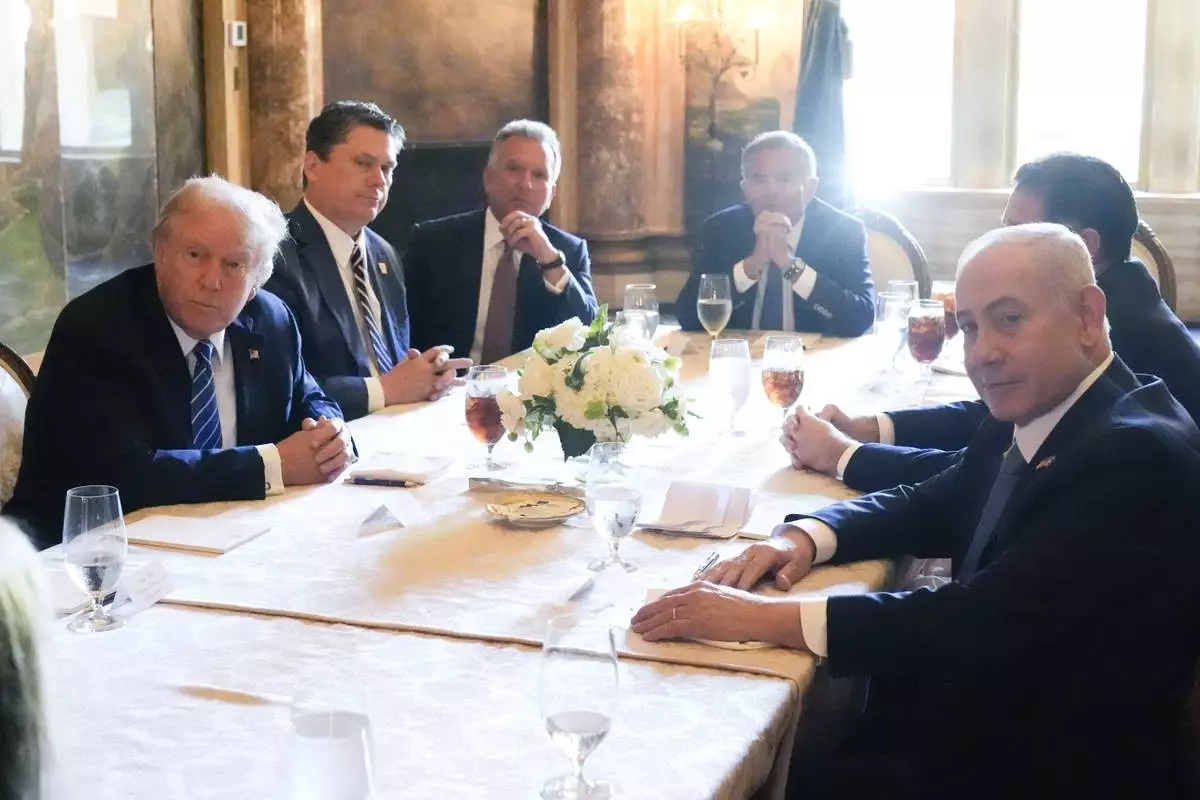
Republican presidential candidate former President Donald Trump meets with Israeli Prime Minister Benjamin Netanyahu at his Mar-a-Lago estate, Friday, July 26, 2024, in Palm Beach, Fla. (AP Photo/Alex Brandon)
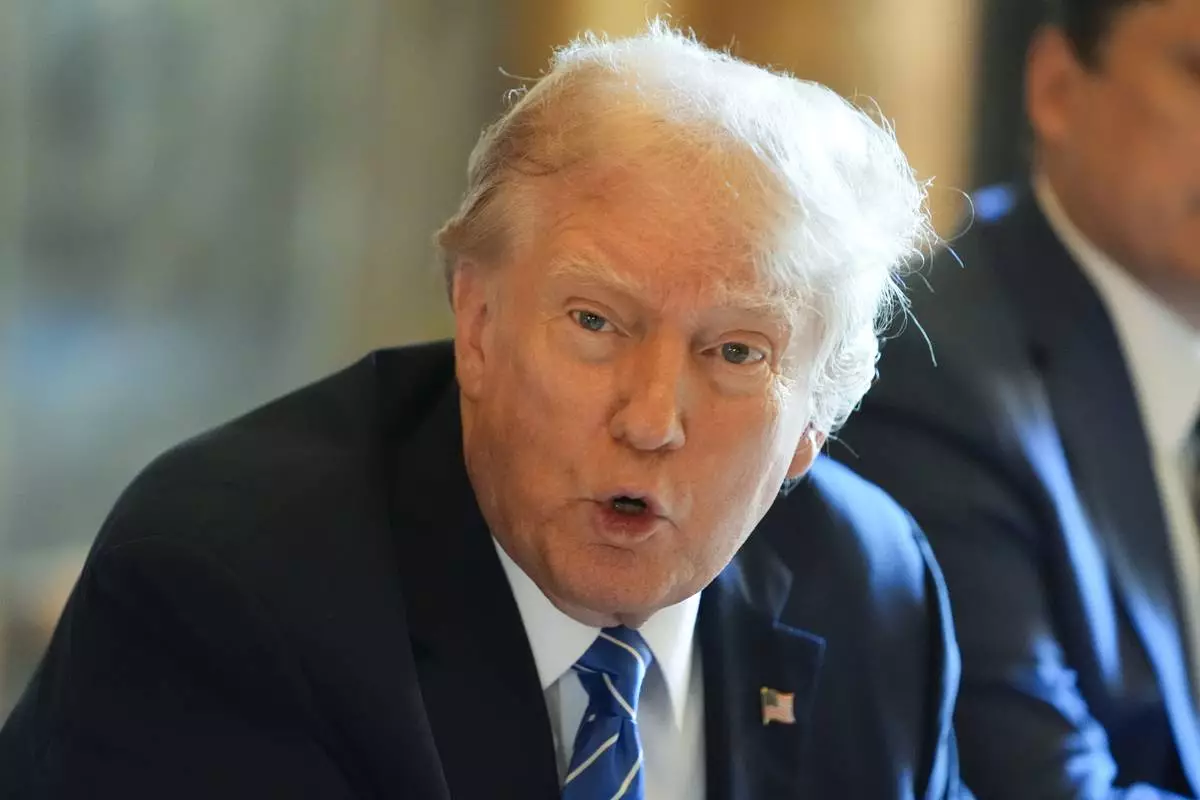
Republican presidential candidate former President Donald Trump speaks while meeting with Israeli Prime Minister Benjamin Netanyahu at his Mar-a-Lago estate, Friday, July 26, 2024, in Palm Beach, Fla. (AP Photo/Alex Brandon)
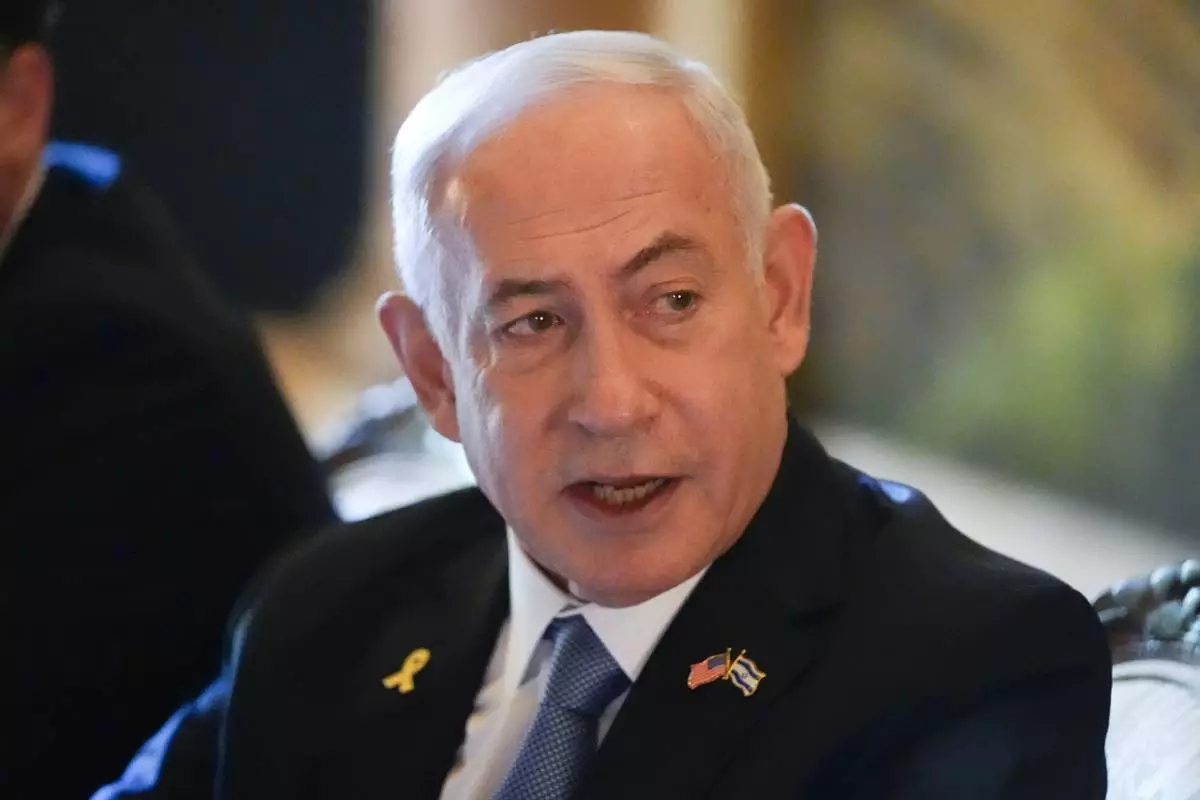
Israeli Prime Minister Benjamin Netanyahu speaks while meeting with Republican presidential candidate former President Donald Trump at his Mar-a-Lago estate, Friday, July 26, 2024, in Palm Beach, Fla. (AP Photo/Alex Brandon)

Republican presidential candidate former President Donald Trump meets with Israeli Prime Minister Benjamin Netanyahu, right, at his Mar-a-Lago estate, Friday, July 26, 2024, in Palm Beach, Fla. (AP Photo/Alex Brandon)
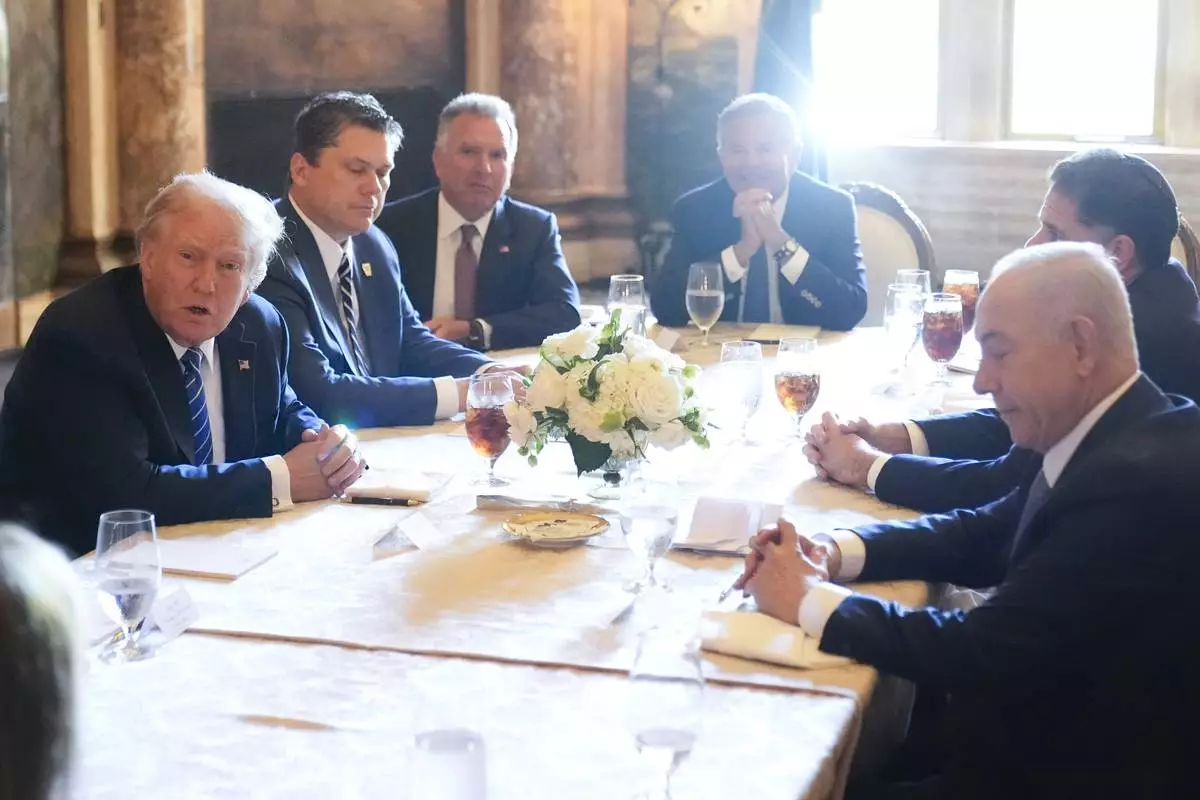
Republican presidential candidate former President Donald Trump meets with Israeli Prime Minister Benjamin Netanyahu at his Mar-a-Lago estate, Friday, July 26, 2024, in Palm Beach, Fla. (AP Photo/Alex Brandon)

Republican presidential candidate former President Donald Trump meets with Israeli Prime Minister Benjamin Netanyahu at his Mar-a-Lago estate, Friday, July 26, 2024, in Palm Beach, Fla. (AP Photo/Alex Brandon)

FILE - President Donald Trump, right, meets with Israeli Prime Minister Benjamin Netanyahu in the Oval Office, Sept. 15, 2020, at the White House in Washington. Trump is due to talk face-to-face with Netanyahu for the first time in nearly four years. The meeting Friday, July 26, 2024, at Mar-a-Lago will mend a break that has lasted since 2021. Trump at the time blasted Netanyahu for being one of the first leaders to congratulate President Joe Biden for his election victory. (AP Photo/Alex Brandon, File)





















